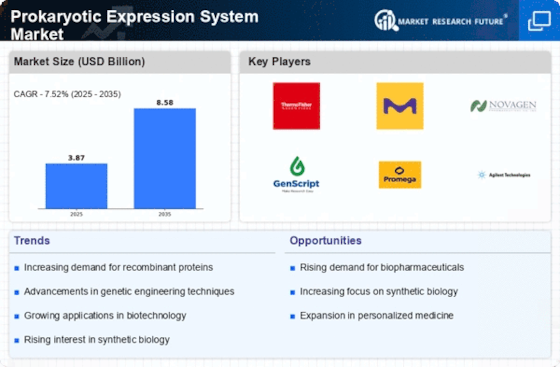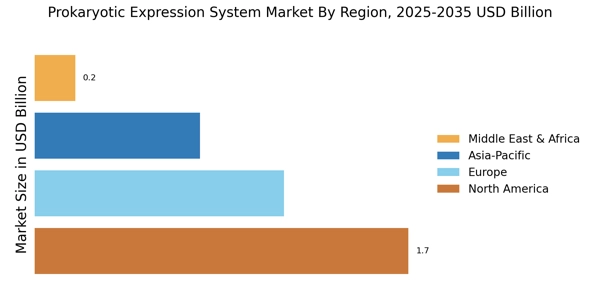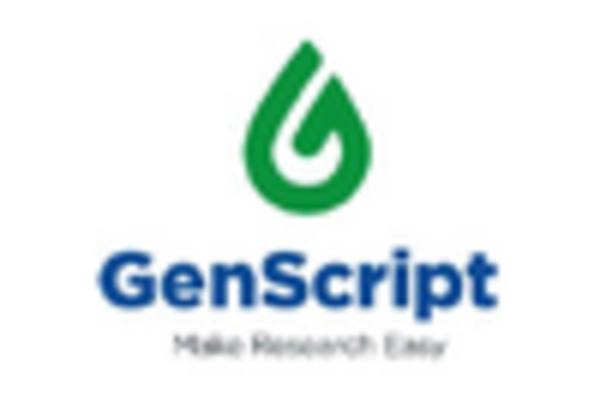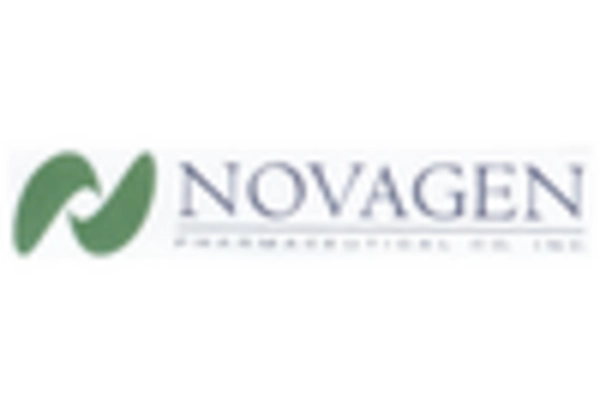Advancements in Genetic Engineering
Technological advancements in genetic engineering are significantly influencing the Prokaryotic Expression System Market. Innovations such as CRISPR-Cas9 and synthetic biology are enhancing the efficiency and precision of gene editing, allowing for the development of more effective expression systems. These advancements enable researchers to optimize protein yield and functionality, which is crucial for various applications, including vaccine development and enzyme production. The market for genetic engineering tools is expected to grow at a compound annual growth rate of 12% over the next five years, suggesting a strong correlation with the prokaryotic expression systems. As these technologies evolve, they are likely to create new opportunities and applications within the prokaryotic expression landscape.
Growing Investment in Biotechnology
Investment in biotechnology is a critical driver for the Prokaryotic Expression System Market. Venture capital funding and government grants are increasingly directed towards biotechnological innovations, particularly in the fields of drug development and synthetic biology. In recent years, investments in biotechnology have surged, with estimates indicating a total investment of over USD 100 billion in 2025. This influx of capital is likely to enhance research and development efforts, leading to the creation of more advanced prokaryotic expression systems. As biotechnology continues to attract significant financial resources, the prokaryotic expression market is expected to thrive, fostering innovation and growth.
Increased Focus on Biomanufacturing
The Prokaryotic Expression System Market is benefiting from a heightened focus on biomanufacturing processes. As industries shift towards sustainable and efficient production methods, prokaryotic systems are increasingly recognized for their ability to produce high yields of proteins with minimal environmental impact. The biomanufacturing market is projected to grow significantly, with estimates suggesting it could reach USD 300 billion by 2025. This growth is attributed to the rising demand for biopharmaceuticals and the need for sustainable practices in manufacturing. Prokaryotic expression systems, with their rapid growth rates and lower production costs, are well-positioned to meet these demands, thereby driving market expansion.
Rising Demand for Recombinant Proteins
The Prokaryotic Expression System Market is experiencing a notable surge in demand for recombinant proteins, which are essential in various biopharmaceutical applications. This demand is driven by the increasing prevalence of chronic diseases and the need for effective therapeutic proteins. According to recent estimates, the recombinant protein market is projected to reach USD 500 billion by 2026, indicating a robust growth trajectory. Prokaryotic systems, particularly E. coli, are favored for their cost-effectiveness and rapid production capabilities, making them ideal for large-scale protein synthesis. As biopharmaceutical companies seek to streamline their production processes, the reliance on prokaryotic expression systems is likely to intensify, further propelling the market forward.
Expanding Applications in Research and Industry
The Prokaryotic Expression System Market is witnessing an expansion of applications across various sectors, including pharmaceuticals, agriculture, and food technology. The versatility of prokaryotic systems allows for the production of a wide range of proteins, enzymes, and bioactive compounds, which are increasingly utilized in diverse applications. For instance, the use of prokaryotic expression systems in the production of enzymes for industrial processes is gaining traction, with the enzyme market projected to reach USD 10 billion by 2027. This broadening scope of applications is likely to drive demand for prokaryotic expression systems, as industries seek efficient and cost-effective solutions for their production needs.

















